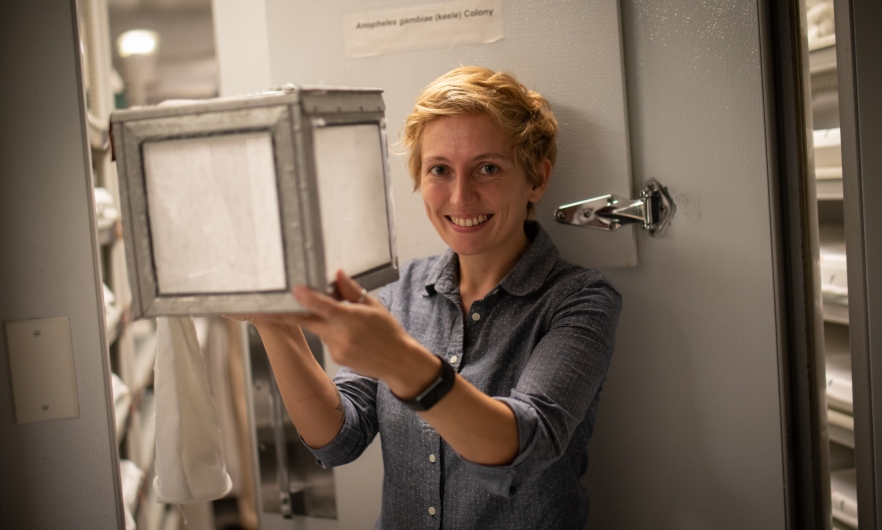MMI Postdoctoral Fellow Stephanie Rankin-Turner, PhD, Receives Samuel Jordan Graham Postdoctoral Fellowship Award

MMI Postdoctoral Fellow Stephanie Rankin-Turner, PhD, Receives the Samuel Jordan Graham Postdoctoral Fellowship Award
The Johns Hopkins Bloomberg School of Public Health and the School of Medicine recently selected Stephanie Rankin-Turner, PhD, a postdoctoral fellow in the Bloomberg School’s Department of Molecular Microbiology and Immunology, as the recipient of the Samuel Jordan Graham Postdoctoral Fellowship Award funded by the Judge and Mrs. Samuel Jordan Graham Memorial Fund.
The Fund provides support for a postdoctoral fellow working on foundational or translational research integrating both medical and public health perspectives under the supervision of faculty co-mentors from both Hopkins schools. The fund will provide $65,000 in support.
Rankin-Turner studies the chemical basis of mosquito attraction to humans, in particular the chemical variation in human odor and how these differences influence the degree to which mosquitoes are attracted to humans. When a mosquito is searching for a human to bite for a bloodmeal, one of the cues they use is a human’s unique scent, which is made up of chemicals released through human skin and breath. This unique odor—which causes some people to get bitten by mosquitoes often and others not at all—could prove pivotal in developing interventions that thwart mosquito-to-human disease transmission.
Rankin-Turner’s research will focus on Anopheles gambiae, the African malaria mosquito, but the technique used in the study can be applied to identify odors attractive to other mosquito species that prefer humans, like the Aedes aegypti, the primary vector of Dengue and Zika.
Conor McMeniman, PhD, an assistant professor in the Bloomberg School’s Department of Molecular Microbiology and Immunology, and Matthew Ippolito, MD, PhD, an assistant professor at the School of Medicine, will provide mentorship to Rankin-Turner through their respective research groups. Both faculty mentors are members of the Johns Hopkins Malaria Research Institute at the Bloomberg School.
The review committee was particularly impressed with Rankin-Turner’s role in helping design and construct a scent collection chamber for capturing volatilomic signatures from humans. Volatilomics is the study of airborne compounds from any living organism. These volatile compounds make up our body odor and influence how we smell. Rankin-Turner’s research will include lab work with McMeniman focused on identification of human odor signals attractive to mosquitoes and field validation with Ippolito in Zambia, Africa.
Rankin-Turner received her PhD in chemistry from Loughborough University (UK). Rankin-Turner was drawn to Johns Hopkins and the Bloomberg School by the research. “Professor Conor McMeniman and his lab have been conducting some fascinating studies into mosquito olfaction and what drives the attraction of mosquitoes to humans. When I learned that he was looking for an analytical chemist to take the research in a new direction, I couldn’t pass up the opportunity to join his team and apply my skills in using analytical chemistry to characterize human body volatile chemicals to such an unusual and exciting area of research.”
Rankin-Turner’s research will also focus on developing more effective mosquito traps that use synthetic chemical lures that mimic human scent. Her research will utilize chemicals identified in the whole body odor of malaria-infected humans, whose scent is more attractive to mosquitoes, to design new traps mimicking the smell of these humans to efficiently capture mosquitoes for malaria control.
